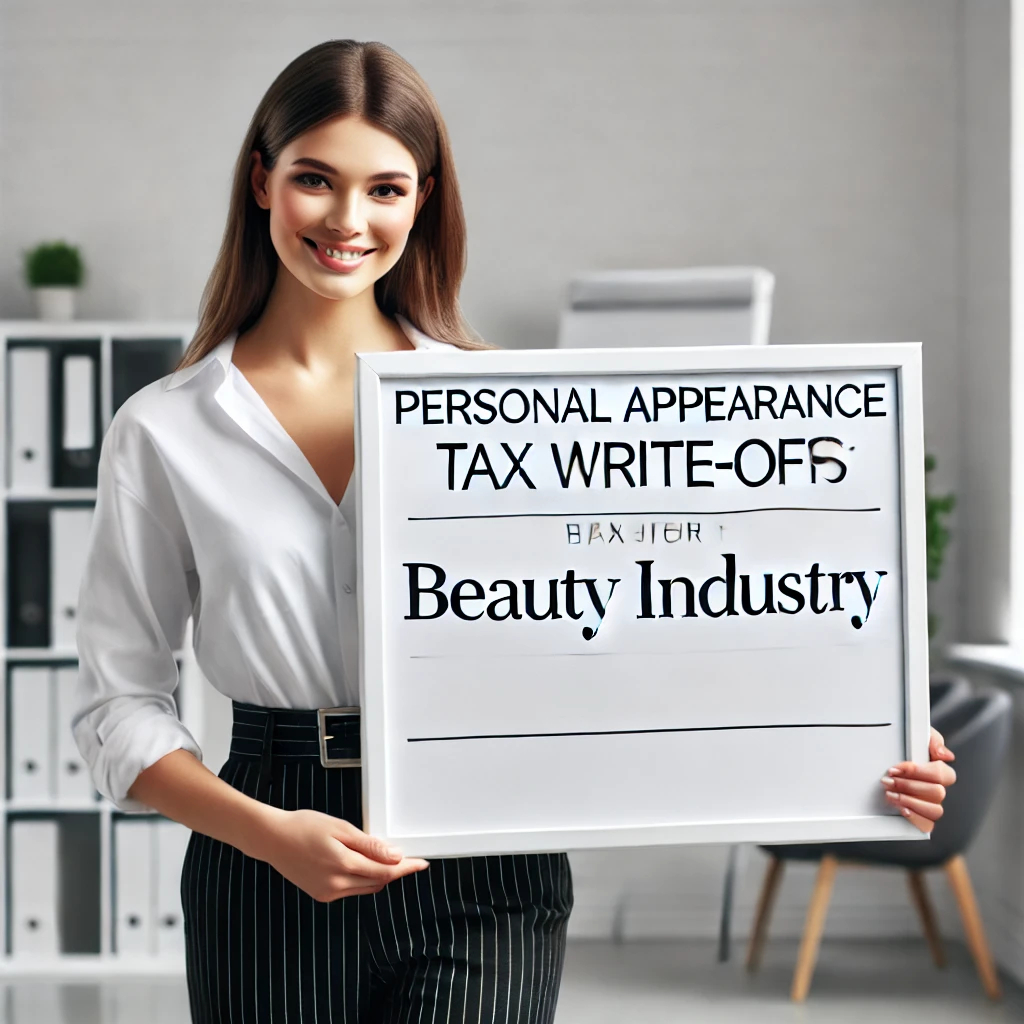Personal appearance plays a vital role in how we are perceived in both professional and social settings. Whether you are a hairstylist, barber, esthetician, influencer, or business owner, how you present yourself can impact your success. Maintaining a polished appearance is crucial, but it often comes with financial costs that can add up, especially for professionals in the beauty and fashion industries.
In this blog, we will explore the importance of personal appearance and how professionals can manage related expenses through tax deductions. We’ll dive into common write-offs for hairstylists, estheticians, influencers, and other professionals in the beauty industry. Additionally, we’ll feature a testimonial from a satisfied client of Etiquette Service Group, a leader in accounting and bookkeeping services, based in Enterprise, Nevada. And remember, if you need the best Accounting and Bookkeeping services, contact Etiquette Service Group at Etiquette Service Group.
The Importance of Personal Appearance in Professional Life
Personal appearance can make or break first impressions. In many industries, particularly beauty, fashion, and entertainment, appearance is a fundamental part of the job. But maintaining a professional look requires time, effort, and financial investment.
Professionals such as hairstylists, makeup artists, and estheticians are often expected to embody the essence of beauty, making their own appearance a marketing tool for their services. Likewise, influencers and content creators must keep up with fashion trends and personal grooming to engage their audience effectively.
Key Factors for Personal Appearance:
- First Impressions Matter: Whether meeting a client or interacting with peers, your appearance speaks volumes before you say a word.
- Building Trust: Looking polished and professional helps instill confidence in your skills and services.
- Branding: For professionals in the beauty industry, your appearance is a reflection of your brand.
Maintaining an exceptional appearance is vital, but it can be costly. Thankfully, many of the associated expenses can be tax-deductible if managed correctly.
Tax Write-Offs for Beauty Professionals: Save Money While Looking Good
One of the benefits of being self-employed in the beauty industry is the ability to write off many business-related expenses. However, navigating what is deductible can be tricky. Here’s a breakdown of some key tax write-offs for professionals in beauty and personal appearance industries:
Write-Off OnlyFans Cut & Influencer Expenses
Influencers, including those on platforms like OnlyFans, need to maintain their appearance to attract followers and build their brand. From wardrobe to beauty products, these expenses can often be claimed as deductions.
- Can Influencers Write Off Clothes?: Yes, influencers can claim clothing costs if the clothes are used solely for business purposes, such as photoshoots or appearances.
- OnlyFans Tax Write-Offs: Content creators on platforms like OnlyFans can also deduct makeup, clothing, and even props used in their content.
Self-Employed Hair Stylist Taxes
As a self-employed hairstylist, you’re responsible for managing your own taxes, but you also have the advantage of numerous tax deductions. Common deductions include:
- Hairstylist Write-Offs: Hair products, tools, and equipment used for clients are all deductible.
- Uniforms: Apparel such as esthetician uniforms and other professional attire required for work can also be claimed.
- Self-Employed Hairdresser Tax: As a self-employed professional, you can deduct advertising, supplies, and continuing education costs.
Dry Cleaning and Uniforms
Personal appearance professionals need to keep their uniforms and work clothes in top shape, which often involves frequent dry cleaning.
- Is Dry Cleaning Tax-Deductible?: Yes, if the dry cleaning is for uniforms or specific work attire that cannot be worn outside of work.
- Tax Uniform Deduction: Work uniforms that are required by the employer and not suitable for everyday wear can be claimed as a deduction.
Barber and Hairstylist Deductions
For barbers and hairstylists, the list of potential deductions is long, including:
- Barber Expenses List: Scissors, clippers, and other tools of the trade.
- Hair Stylist Write-Offs: Equipment maintenance, client refreshments, and beauty products.
- Hairstylist Tax Deduction Checklist: This can include professional dues, education, and even rent for a booth or chair.
Here’s a table summarizing some common deductions for beauty professionals:
| Expense | Deductible? | Details |
| Clothes for Business (Influencers) | Yes | Must be used solely for business purposes |
| Tools & Equipment (Hair Stylist) | Yes | Scissors, clippers, dryers, etc. |
| Dry Cleaning | Yes | For uniforms or work-specific attire |
| Makeup & Skincare (Content Creators) | Yes | Used in professional content or branding |
| Work Uniforms (Estheticians) | Yes | Must not be suitable for personal wear |
| Continuing Education | Yes | Courses that improve job skills |
Common Questions About Tax Deductions for the Beauty Industry
Q. Can You Write Off Dry Cleaning?
Yes, but only if it’s for work-specific attire such as uniforms. Everyday clothing, even if worn for work, generally doesn’t qualify.
Q. Is Dry Cleaning a Business Expense?
Yes, for uniforms or business-related attire. You can also claim this under the IRS costume guidelines if the clothing is not suitable for everyday wear.
Q. Is a Massage a Tax-Deductible Business Expense?
In some cases, a massage can be considered a deductible expense if it’s required for your job (for example, if you’re a personal trainer or therapist). However, the rules are strict, and you must show that it directly benefits your business.
Q. Self-Employed Therapist Tax Deductions
For therapists, the ability to deduct expenses like professional attire, dry cleaning, and even wellness-related costs like massages can reduce your overall tax liability.
Q. Can I Write Off Wedding Expenses?
Wedding expenses are generally not deductible unless you can prove they are directly related to your business. For example, a photographer or wedding planner might be able to claim certain business-related costs.
Best Practices for Managing Beauty Industry Tax Write-Offs
- Keep Detailed Records: Ensure you keep receipts for every business-related expense, as you’ll need proof if the IRS asks questions.
- Categorize Your Expenses: Use accounting software or spreadsheets to categorize your expenses and make filing easier.
- Consult a Professional: Work with a tax professional who understands the beauty industry. They can help you find additional deductions and keep you compliant with tax laws.
Testimonial: What Our Clients Say
At Etiquette Service Group, we specialize in helping beauty professionals manage their accounting and bookkeeping. Here’s what one of our happy clients from Enterprise, Nevada had to say:
“As a self-employed hairstylist, I was overwhelmed with tracking my expenses and figuring out my taxes. I found Etiquette Service Group, and they completely transformed how I manage my finances. Their team helped me maximize my deductions, and now tax season is a breeze!” — Emily R., Enterprise, NV
Contact Etiquette Service Group
If you’re looking for expert accounting and bookkeeping services tailored to the beauty industry, contact Etiquette Service Group today. We offer personalized solutions to help you manage your finances and maximize your tax write-offs. Visit us at Etiquette Service Group to learn more.
Additional Resources:
- Learn more about managing beauty industry expenses at the Journal of Accountancy: Journal of Accountancy.
- For tips on managing tax write-offs for beauty professionals, check out this IRS Guide: IRS Tax Deductions Guide.
Tax write-offs can significantly reduce your taxable income and help you save money. By understanding what expenses qualify and working with an experienced tax professional, you can focus on what you do best—making people look and feel their best—while letting experts handle your finances.

